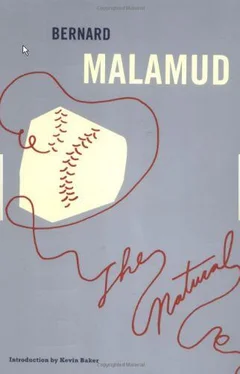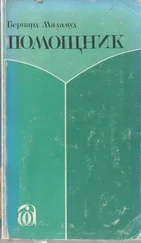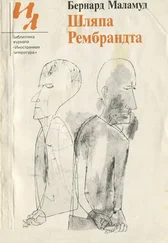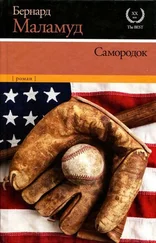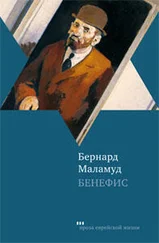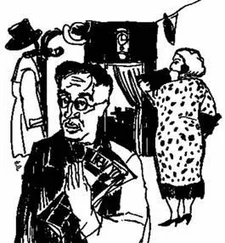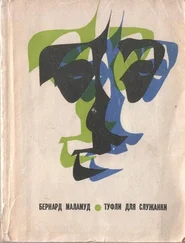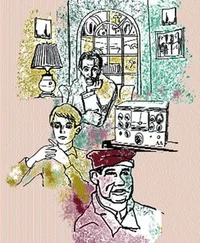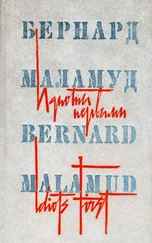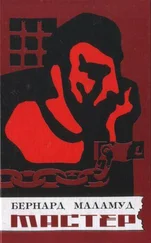Бернард Маламуд - The Natural
Здесь есть возможность читать онлайн «Бернард Маламуд - The Natural» весь текст электронной книги совершенно бесплатно (целиком полную версию без сокращений). В некоторых случаях можно слушать аудио, скачать через торрент в формате fb2 и присутствует краткое содержание. Жанр: Классическая проза, на английском языке. Описание произведения, (предисловие) а так же отзывы посетителей доступны на портале библиотеки ЛибКат.
- Название:The Natural
- Автор:
- Жанр:
- Год:неизвестен
- ISBN:нет данных
- Рейтинг книги:4 / 5. Голосов: 1
-
Избранное:Добавить в избранное
- Отзывы:
-
Ваша оценка:
- 80
- 1
- 2
- 3
- 4
- 5
The Natural: краткое содержание, описание и аннотация
Предлагаем к чтению аннотацию, описание, краткое содержание или предисловие (зависит от того, что написал сам автор книги «The Natural»). Если вы не нашли необходимую информацию о книге — напишите в комментариях, мы постараемся отыскать её.
The Natural — читать онлайн бесплатно полную книгу (весь текст) целиком
Ниже представлен текст книги, разбитый по страницам. Система сохранения места последней прочитанной страницы, позволяет с удобством читать онлайн бесплатно книгу «The Natural», без необходимости каждый раз заново искать на чём Вы остановились. Поставьте закладку, и сможете в любой момент перейти на страницу, на которой закончили чтение.
Интервал:
Закладка:
It came about that Roy discovered Memo at one of the home games, though not, as formerly, sitting in the wives’ box. Happening to meet her later in the hotel elevator, where they were pressed close together because of the crowd, he got off at her floor. Taking her arm he said, “Memo, I don’t know what more I can do to show you how sorry I am about that time and tell you how I feel in my heart for you now.”
But Memo stared at him through a veil of tears and said, “I’m strictly a dead man’s girl.”
He figured she had to be made to forget. If she would go out with him he would give her a good time at the night clubs and musical shows. But to do that and buy her some decent presents a guy needed cash, and on the meager three thousand he got he had beans — barely enough to pay his hotel bill. He considered selling his name for endorsements and approached a sporting goods concern but they paid him only fifty dollars. Elsewhere he got a suit and a pair of shoes but no cash. An agent he consulted advised him that the companies were suspicious he might be a flash in the pan. “Lay low now,” he advised. “By the end of the season, if you keep on like you’re going, they’ll be ready to talk turkey, then we’ll put the heat on.
The newspaper boys supplied him with the cue for what to do next. They pointed out how he filled up Knights Field; and on the road, as soon as the Knights blew into town the game was a sellout and the customers weren’t exactly coming to see a strip-tease. One of the columnists (not Mercy) wrote an open letter to the Judge, saying it was a crying shame that a man as good as Roy should get a rock-bottom salary when he was playing better ball than some of the so-called stars who drew up to a hundred grand. Roy was being gypped, the columnist wrote, and he called on the Judge to burn up his old contract and write a decent one instead. Why, even Bump had earned thirty-five thousand. That decided Roy. He figured for himself a flat forty-five thousand for the rest of the season, plus a guarantee of a percentage of the gate. He thought that if he got this sort of arrangement and really piled in time dough, it would do him no harm with Memo.
So one day after a long double header, both ends of which the Knights finally took, Roy climbed the slippery stairs up the tower to the Judge’s office. The Judge’s male secretary said he was busy but Roy sat down to wait so they soon let him in. The huge office was half dark, though lit on the doublewindowed street side (the Judge counted the customers going in and from the opposite window he counted them in the stands) by the greenish evening sky. The Judge, a massive rumpled figure in a large chair before an empty mahogany desk, was wearing a black fedora with a round pot crown and smoking, under grizzled eyebrows, a fat, black King Oscar I. This always looked to be the same size in the rare newspaper photographs of the Judge, and many people maintained it was the same picture of him all the time, because it was a known fact that the Judge never left the tower and no photographer ever got in. Roy noted a shellacked half of stuffed shark, mounted on pine board on the faded green wall, and a framed motto piece that read:
“Be it ever so humble, there is no place like home”
“Nihil nisi bonum”
“All is not gold that glitters”
“The dog is turned to his vomit again”
The floor of the office was, of course, slanted — because of the way the tower, an addition to the stadium structure, had settled — and to level it the Judge had a rug made a quarter of an inch thick on one side and a good inch on the other, but the few visitors to the place noticed they were not standing strictly on keel so they quickly sat down, which was what Roy did too. He had heard that the door on the opposite side of the room led up to the Judge’s apartment. Pop said that though the Judge was a sluggish man with a buck it was a lavish place, and the bathroom had a television set and a sunken bathtub inlaid with mother of pearl. It was also rumored that he kept in there two enormous medicine cabinets loaded with laxatives and cathartics.
The Judge looked Roy over, struck a match under the top of his desk and drew a flame into his dead King Oscar. He blew out a smelly cloud of yellow smoke that hid his face a full minute.
“Nice of you to come,” he rumbled. “To what good cause may I attribute this pleasant surprise?”
“I guess you know, Judge,” said Roy, trying to make himself comfortable.
The Judge rumbled in his belly.
“I’m reminded of a case that came before me once. ‘What do you plead?’ I asked the defendant. ‘I leave it to you, Judge, take your choice,’ he responded. I did and sent him to the penitentiary for twenty years.”
The Judge coughed and cackled over that. Roy regarded him closely. Everybody had warned him he was a slick trader, especially Pop who had poured out a hot earful about his partner. “He will peel the skin off of your behind without you knowing it if you don’t watch out.” That was what had happened to him, he said, and he went on to tell Roy that not long after the Judge had bought into the club — after working up Charlie Gulch, Pop’s old-time partner, against him and getting him to sell out — he had taken advantage of some financial troubles Pop was having with his two brothers who owned a paint factory, and also because of his own sickness that kept him in a hospital under expensive medical care all winter long, and the Judge put the squeeze on him to get ten per cent of his stock for a pittance, which had then looked like a life saver because Pop was overdrawn at the bank and they wouldn’t lend him another cent on his share of the Knights. Later, when he realized how much of a say in things he had lost to the Judge he kicked himself all over the lot, for the Judge, as Red Blow had told Roy, drummed up all sorts of player deals to turn a buck, and though Pop fought him on these, he showed on paper that they were losing money at the gate and this was the only way to cover their losses and keep the team going, so Pop had to give in on most of them although he had fought the Judge to a standstill when he wanted to sell Bump and would do the same if he tried it with Roy. It beat Pop where Goodie Banner, as he called him, had got the money to operate with in the first place. He had known him years ago as an impoverished shyster but once he got on the bench his fortunes improved. Yet his salary was only twelve thousand a year for the three years he had served so he must have had backing to buy into the club and later — the dratted nerve of the worm — to offer to buy Pop out altogether. He said he wouldn’t exactly call the Judge a thief but he wouldn’t exactly call him honest either. For instance, the Judge had once casually asked Pop if he wanted to go in for any sideline activities over what they had already contracted for, meaning concessions and the like. Pop said no, he was only interested in the game end of it, so the Judge drew up an agreement offering Pop five per cent of all receipts from enterprises initiated by himself, and he began to rent the place to miniature auto races, meetings, conventions, and dog races, making all sorts of money for himself, while things necessary to the team were being neglected. “When triple talk is invented,” Pop said bitterly, “he will own the copyright.”
It was dark in the office but the Judge made no attempt to switch on the lights. He sat there motionless, a lumpy figure aglow around the edges against the darkening sky.
Roy thought he better get down to brass tacks. “Well, Judge,” he said, shifting in his chair, “I thought you might be expecting me to drop in and see you. You know what I am doing to the ball both here and on the road. The papers have been writing that you might be considering a new contract for me.”
Читать дальшеИнтервал:
Закладка:
Похожие книги на «The Natural»
Представляем Вашему вниманию похожие книги на «The Natural» списком для выбора. Мы отобрали схожую по названию и смыслу литературу в надежде предоставить читателям больше вариантов отыскать новые, интересные, ещё непрочитанные произведения.
Обсуждение, отзывы о книге «The Natural» и просто собственные мнения читателей. Оставьте ваши комментарии, напишите, что Вы думаете о произведении, его смысле или главных героях. Укажите что конкретно понравилось, а что нет, и почему Вы так считаете.
